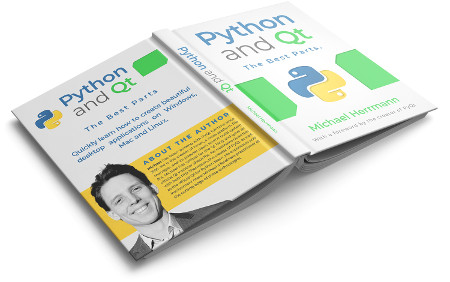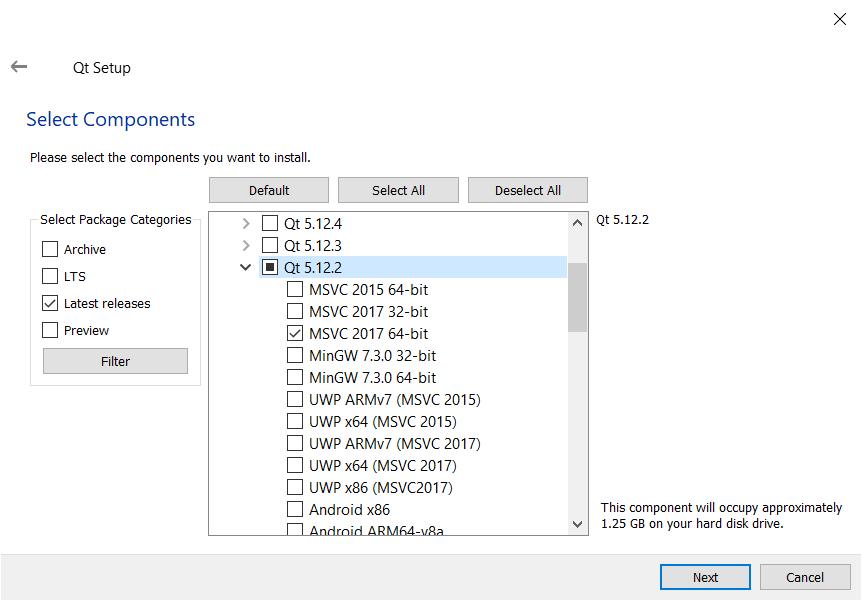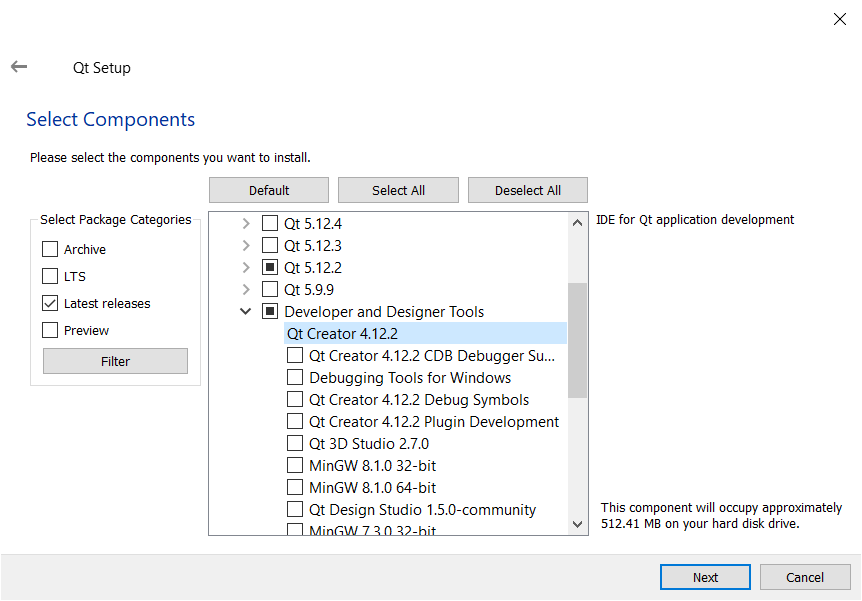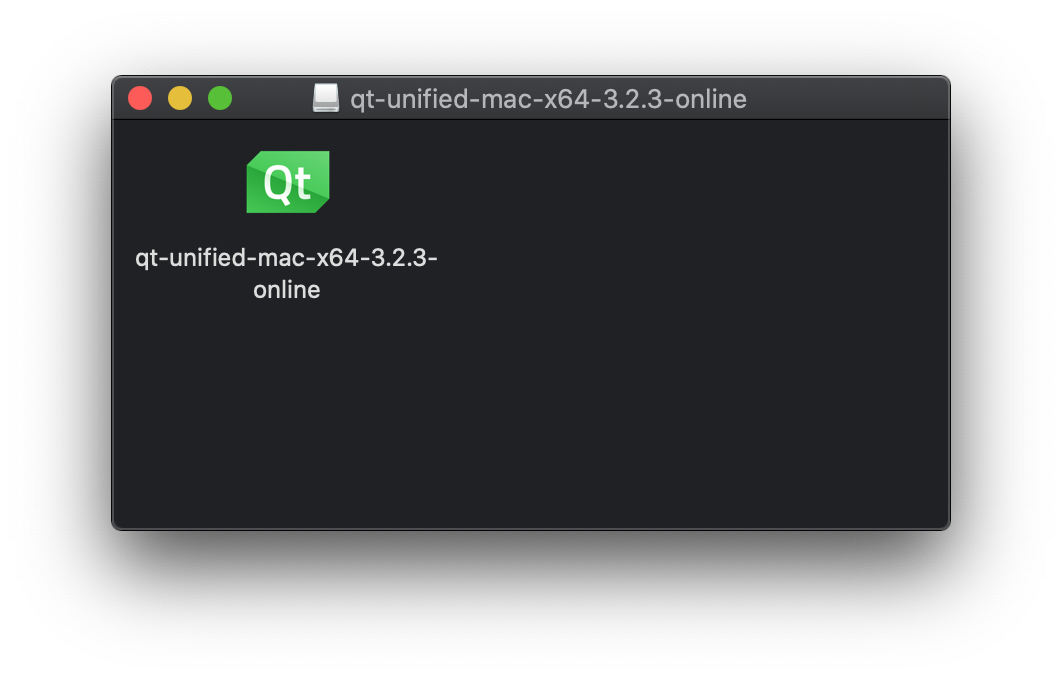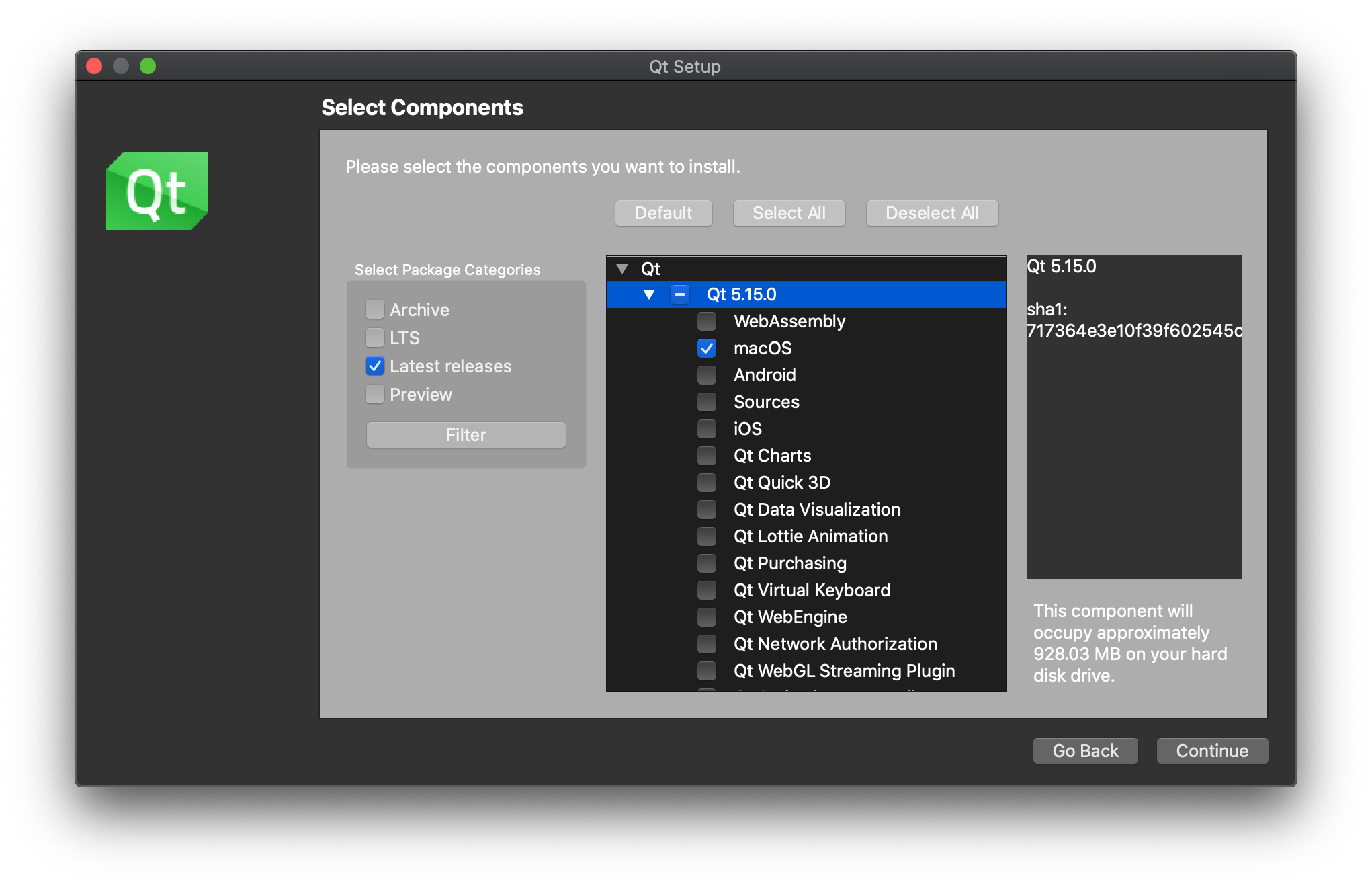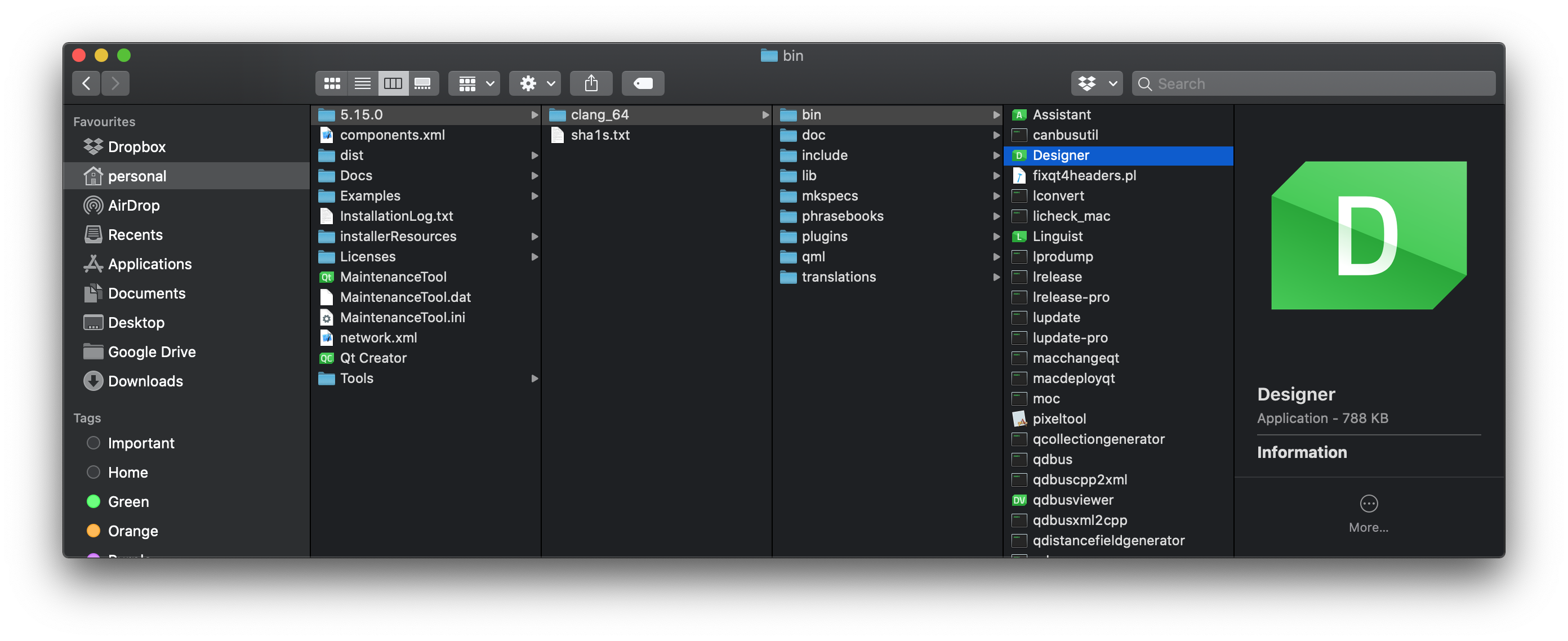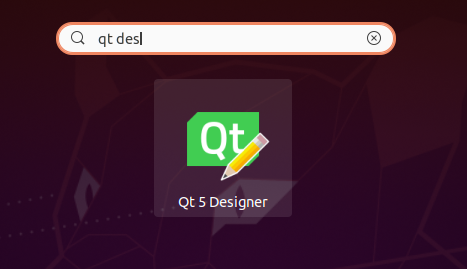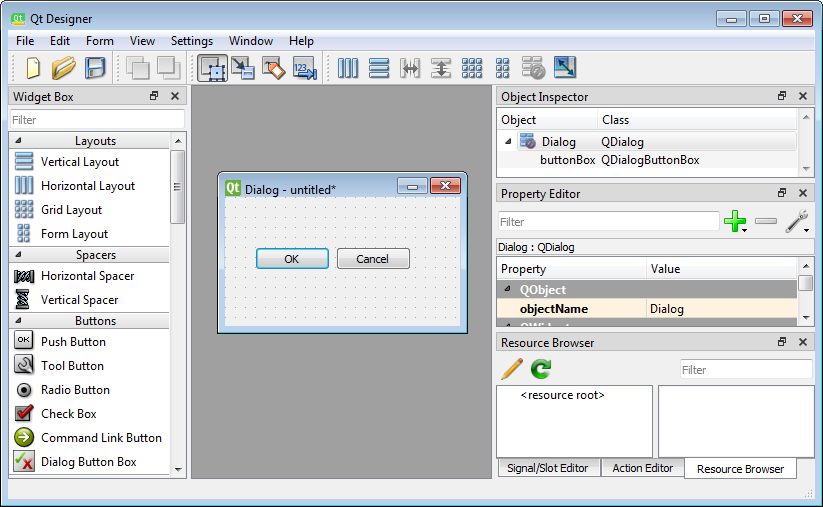
Qt Designer Download
Install Qt Designer on Windows or Mac.
Tiny download: Only 40MB!
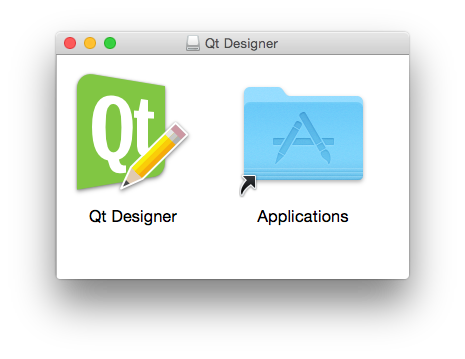
Many people want to use Qt Designer without having to
download gigabytes of other software. Here are small,
standalone installers of Qt Designer for Windows and Mac:
What is Qt Designer?
Qt Designer is a tool for quickly building graphical user
interfaces with widgets from the
Qt GUI framework. It gives you a
simple drag-and-drop interface for laying out components
such as buttons, text fields, combo boxes and more. Here is
a screenshot of Qt Designer on Windows:

Qt Designer produces .ui files. This is a
special XML-based format that stores your widgets as a tree.
You can either load these files at runtime, or have them
translated to a programming language such as C++ or Python.
Qt Designer and Python
Many people like to use Qt Designer together with Python
because it is a very productive programming language. The
easiest way to combine the two is via
PyQt or PySide6.
To install PyQt, simply enter the following on the command
line:
python3 -m venv venv source venv/bin/activate # or "call venv\Scripts\activate.bat" on Windows python3 -m pip install PyQt6
(This assumes you have Python 3 installed.)
Suppose you have saved your file from Qt Designer as
dialog.ui. Then you can create another file,
say main.py, with the following contents:
from PyQt6 import uic
from PyQt6.QtWidgets import QApplication
Form, Window = uic.loadUiType("dialog.ui")
app = QApplication([])
window = Window()
form = Form()
form.setupUi(window)
window.show()
app.exec()
When you then invoke python main.py
on the command line, the GUI you created in Designer should
open:
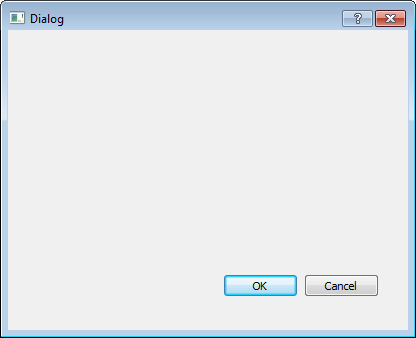
How you can create an installer
Once you’ve created an application with Qt Designer, you
typically want to create an installer for it. On Windows,
this is often an installation wizard in the form of
an .exe:
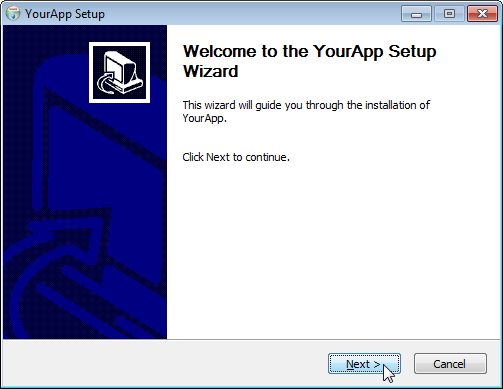
On macOS, .dmg archives are commonly used:
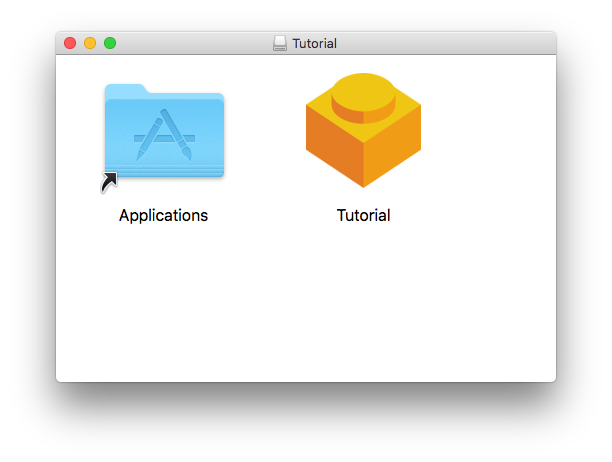
We can use fbs to
create such installers for applications based on Qt and
Python. The free eddition of fbs supports Python 3.6 and
PyQt5. Later versions require
fbs Pro.
Once you’ve installed fbs, you can create an installer for
the Python application from above as follows:
Run the command fbs startproject. This asks you
a few questions about the name of your app etc. It creates
the directory src/main/python. The command
fbs run should now give you a quick preview of
the empty application created by startproject.
Change main.py from before to the following:
from PyQt6 import uic
from PyQt6.QtWidgets import QApplication
from fbs_runtime.application_context.PyQt6 import ApplicationContext
Form, Window = uic.loadUiType(appctxt.get_resource("dialog.ui"))
appctxt = ApplicationContext()
window = Window()
form = Form()
form.setupUi(window)
window.show()
appctxt.app.exec()
Save main.py in src/main/python,
overwriting the existing file there.
Create the directory src/main/resources/base.
Move dialog.ui from above into it. When you now
do fbs run, then you should again see the GUI
you created in Designer.
Run the command fbs freeze. This turns your
Python (and Designer) code into a standalone executable that
can be copied to other computers.
Then execute fbs installer. On Windows, you
need to install NSIS first and place it on your
PATH. On Linux, you need
fpm. But
once you have these prerequisites, fbs will magically create
your installer. Congratulations!
Where to learn more
If you want to learn more about combining Qt Designer with
Python, you may be interested in my
book:
It distills years of experience to quickly help you create
better GUI applications. I’m humbled to say that even Phil
Thompson, the creator of PyQt, read it and thinks it’s
«very good».
Qt Designer vs. Qt Creator
Qt Designer normally ships as a part of Qt Creator.
This is Qt’s official editor and lets you do a lot more than
just graphically design user interfaces. It is a
full-fledged and very powerful C++ IDE. This power comes at
a price however: The download for Qt Creator is gigabytes in
size!
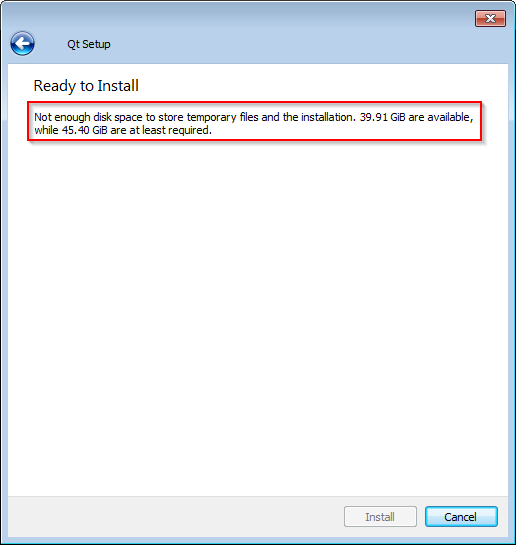
This page was created for people who only need Qt Designer.
The download links here contain minimal, self-contained
installers of just Qt Designer that are orders of magnitude
smaller. Here they are again:

Michael has been working with Qt and Python since
2016, when he started
fman,
a cross-platform file manager. Frustrated with the
difficulties of creating a desktop app, Michael open
sourced
fman’s build system (fbs). It saves you
months when creating Python Qt GUIs. Recently,
Michael also wrote a popular
book
about these two technologies.
Qt Designer is a cross-platform drag and drop GUI designer, which can be used to build UIs for both PyQt and PySide.
It is a great tool to simplify the process of building interfaces for your applications.
While Qt Designer is distributed by Qt as part of the Qt Creator integrated IDE, most of that IDE is not useful or helpful
for Python development — primarily being designed for C++ developers. If you just want the Designer application, this is
not currently available from Qt. But helpfully, other people have stepped up to make this available.
In this guide we’ll look at the various options available for installing Qt Designer as a standalone application on your system.
Since the Qt Designer software is free software, these alternative distributions of Qt Designer are permitted.
PyQt Command line launcher
Qt Designer is available on PyPi via the pyqt5-tools package. This can be pip installed just like any other Python package.
This wrapper will download and install Qt Designer for you and provide a command-line launcher to start the program.
- PyQt6
- PyQt5
bash
pip install pyqt6-tools
bash
pip install pyqt5-tools
After installation you can run Qt Designer from the command line using the built-in launcher.
- PyQt6
- PyQt5
If this doesn’t work check your Python scripts folder is in your PATH.
PySide6 Command line launcher
In recent versions of PySide6 Qt Designer is installed automatically when you install PySide6 with pip. After installation you can
run Qt Designer from the command line using the built-in launcher.
If this doesn’t work check your Python scripts folder is in your PATH.
The complete guide to packaging Python GUI applications with PyInstaller.
[[ discount.discount_pc ]]% OFF for
the next [[ discount.duration ]]
[[discount.description ]]
with the code [[ discount.coupon_code ]]
Purchasing Power Parity
Developers in [[ country ]] get [[ discount.discount_pc ]]% OFF on all books & courses
with code [[ discount.coupon_code ]]
Installing from Qt Package
If the above installation options don’t work for you, you can instead follow the following instructions to install
Qt Creator or Qt Designer depending on your platform.
If you install Qt Creator you can access Qt Designer through it, even if you don’t use any of the other functionality.
Windows
Qt Designer is available in the installation packages for Qt available from the Qt downloads page. Download and run the appropriate installer for your system and follow the platform-specific instructions below. Installing Qt Designer will not affect your Python PyQt5/6 or PySide2/6 installation.
Qt Designer is not mentioned in the Windows Qt installer, but is automatically installed when you install any version of the Qt core libraries. For example, in the following screenshot we’ve opted to install the MSVC 2017 64-bit version of Qt — what you choose will have no effect on your Designer install.
Installing Qt, will also install Qt Designer.
If you want to install Qt Creator it is listed under «Developer and Designer Tools». Rather confusingly, Qt Designer isn’t in here.
Installing the Qt Creator component.
macOS
Qt Designer is available in the installation packages for Qt available from the Qt downloads page. Download and run the appropriate installer for your system and follow the platform-specific instructions below. Installing Qt Designer will not affect your Python PyQt5/6 or PySide2/6 installation.
Qt Designer is not mentioned in the macOS Qt installer, but is automatically installed when you install any version of the Qt core libraries. Download the installer from the Qt website — you can opt for the open source version.
Inside the downloaded .dmg file you’ll find the installer.
Open the installer to start the installation. Go through to where it asks you to choose which components to install. Select the macOS package under the latest version of Qt.
You only need the macOS package under the latest version.
Once the installation is complete, open the folder where you installed Qt. The launcher for Designer is under <version>/clang_64/bin. You’ll notice that Qt Creator is also installed in the root of the Qt installation folder.
You can find the Designer launcher under the /clang_64/bin folder.
You can run Designer from where it is located, or move it into your Applications folder so it is available to launch from the macOS Launchpad.
Linux (Ubuntu & Debian)
You can install Qt Designer using your package manager. Depending on your distribution and version you will have either
Qt5 Designer or Qt6 Designer available..
- Qt5
- Qt6
bash
sudo apt-get install qttools5-dev-tools
bash
sudo apt-get install designer-qt6
Once installed, Qt Designer will be available in the launcher.
Qt Designer in Ubuntu launcher.
- Products
-
Development Framework & Tools
-
Qt Framework
Cross-platform software libraries and APIs -
Qt Development tools
Qt Creator IDE and productivity tools -
Qt Design Studio
UI Design tool for UI composition -
Qt Quality Assurance
for Qt projects -
Qt Digital Ads
Digital advertising for UI apps -
Qt Insight
Usage intelligence for embedded devices - Qt product updates
-
Qt 6
The latest version of Qt
-
Quality Assurance Tools
-
Squish
GUI test automation -
Coco
Code coverage analysis -
Test Center
Test results management and analysis -
Axivion Static Code Analysis
Software static code analysis -
Axivion Architecture Verification
Software architecture verification
-
- Solutions
We have solutions for your entire cross-platform software development lifecycle.
- Which platform are you targeting?
-
Desktop and Mobile Applications
-
Embedded devices
-
Microcontrollers (MCUs)
- At what stage is your project?
-
Planning and resourcing
-
Designing UI and prototyping
-
Developing, compiling and coding
-
Testing and debugging
-
Deploying and maintaining
- What do you want to improve?
-
Scalable software and UI development
-
User-Centric UX/UI Design
-
Qt World Summit 2023
-
- Which industry needs are you looking to optimize?
-
Automotive design
-
Industrial automation
-
Consumer electronics creation
-
Medical device development
- What is your main responsibility in your current role?
-
Managing a team
-
Developing apps or embedded solutions
-
UI design and prototyping
-
Quality assurance and testing
- Resources
Development Framework and Tools
- The latest Qt resources
-
Qt Blog
-
Live Webinars and Events
-
Qt Customer cases
-
Qt Demos
-
All Qt resources
- Learn Qt tools
-
Qt Academy
-
Get Qt Educational license
- Connect with Qt community
-
Qt Documentation
-
Qt Forum
-
Qt Wiki
-
Contribute to Qt
-
Qt Partners
-
Login to your Qt account
Design Studio, Qt Creator etc.
Quality Assurance Tools
- The latest QA resources
-
QA Blog
-
Live Webinars and Events
-
QA Success Stories
-
QA Resources
- Our QA support for you
-
QA Documentation
-
Knowledge Base
-
QA Partners and resellers
-
Login to your QA account
Squish, Coco, Test Center
Developers
Qt software free trials
Qt provides businesses with commercially viable development projects, a free 10-day evaluation including all our commercial packages and components, plus access to the official Qt support desk for getting started assistance.
Open source user?
Find out how you can use Qt under the (L)GPL and contribute to the Qt project.
Development Framework & Tools
Qt framework, Qt Creator IDE with tools for desktop and embedded development, Qt Design Studio, plus other enterprise add-ons like Qt Digital Advertising platform and Qt Insight for usage intelligence of embedded devices.
Quality Assurance Tools
Quality Assurance tools for your entire software development lifecycle. Squish for automated GUI testing, Coco for code coverage analysis and Test Center for centralized test result management.
For existing Qt customers
Got Qt already and want to upgrade your license or try out the latest Qt 6 release?
Log in
Contact us about Qt 6 license
For existing QA customers
Are you already a customer looking to download your testing tools? Look no further.
Log in
Qt World Summit is going back to Berlin!
We are very excited to announce that we will be going back to Berlin this year. Discover the lineup of exceptional keynotes and breakout stages.
Get your tickets, we can’t wait to see you there!
Explore QtWS23
- Qt Group
- Our Story
- Brand
- News
- Careers
- Investors
- Qt Products
- Quality Assurance Products
- Licensing
- License Agreement
- Open Source
- Plans and pricing
- Download
- FAQ
- Learn Qt
- For learners
- For students and teachers
- Qt Documentation
- Qt Forum
- Support & Services
- Professional Services
- Customer Success
- Support Services
- Partners
- Qt World
Search code, repositories, users, issues, pull requests…
Provide feedback
Saved searches
Use saved searches to filter your results more quickly
Sign up
Qt.QtDesigner, Release version: 5.11.1
Command Line
Download Links For Version 5.11.1
https://build-system.fman.io/static/public/files/Qt%20Designer%20Setup.exe
Download
Info
last updated 4/23/2023 5:15:13 AM
Publisher:
License:
Dependencies
No dependency information
